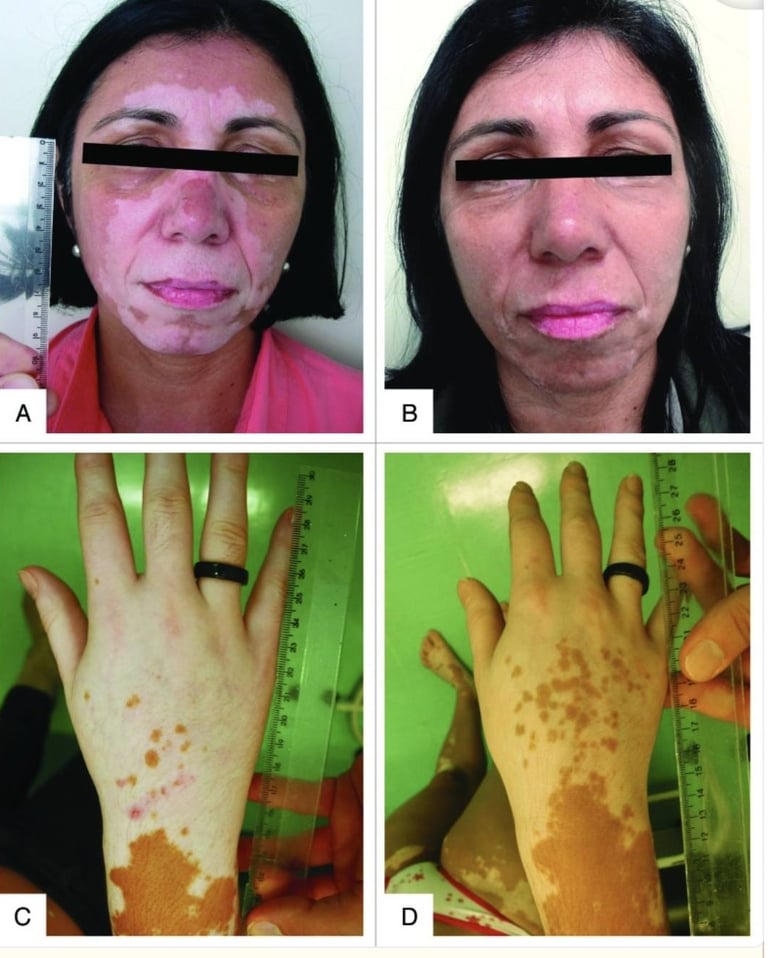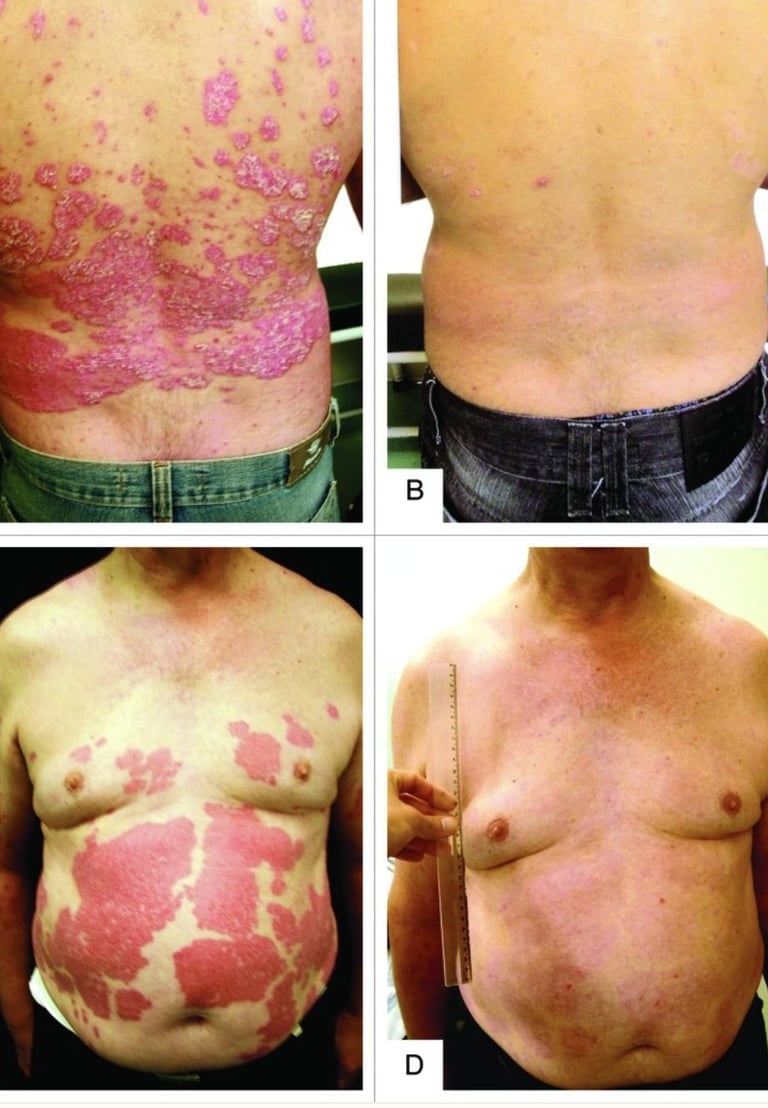Medical content is for information only - not a substitute for professional guidance.
Scientific studies of the Coimbra Protocol
Updated on October/25
1) A pilot study assessing the effect of prolonged administration of high daily doses of vitamin D on the clinical course of vitiligo and psoriasis (Dermatoendocrinology, 2013)
Summary
This pilot study evaluated the clinical effects of prolonged daily high-dose vitamin D administration on patients with vitiligo and psoriasis. The results showed significant improvement in skin lesions, suggesting that vitamin D plays an important role in immune regulation and skin health.




Reference
Finamor DC, Sinigaglia-Coimbra R, Neves LCM, et al.
A pilot study assessing the effect of prolonged administration of high daily doses of vitamin D on the clinical course of vitiligo and psoriasis.
Dermatoendocrinol. 2013;5(1):222–234. doi:10.4161/derm.24808.
PMCID: PMC3897595. PMID: 24494059.
Full text (PMC):
https://www.ncbi.nlm.nih.gov/pmc/articles/PMC3897595/
Before and after photos of vitamin D treatment for psoriasis (reproduced from the article for informational purposes).
Before and after photos of vitamin D treatment for vitiligo (reproduced from the article for informational purposes).
2) Vitamin D resistance as a possible cause of autoimmune diseases: A hypothesis confirmed by a therapeutic high-dose vitamin D protocol (Frontiers in Immunology, 2021)
Summary
This hypothesis and theory article suggests that acquired resistance to vitamin D could be a common pathological mechanism in the development of autoimmune diseases. The authors propose that this phenomenon may be explained and therapeutically addressed through a high-dose vitamin D protocol.
Reference
Lemke D, Klement RJ, Schweiger F, Schweiger B, Spitz J.
Vitamin D Resistance as a Possible Cause of Autoimmune Diseases: A Hypothesis Confirmed by a Therapeutic High-Dose Vitamin D Protocol.
Front Immunol. 2021 Apr 7;12:655739. doi:10.3389/fimmu.2021.655739.
PMID: 33897704; PMCID: PMC8058406.
Full text (publisher):
https://doi.org/10.3389/fimmu.2021.655739
3) Safety data in patients with autoimmune diseases during treatment with high doses of vitamin D3 according to the "Coimbra Protocol" (Nutrients, 2022)
Summary
This study, published in Nutrients (2022), analyzed clinical and laboratory data to evaluate the safety of treating autoimmune disease patients with high doses of vitamin D3 under the Coimbra Protocol. The results confirmed that, when individually monitored, the protocol is considered safe and well tolerated.
Reference
Amon U, Yaguboglu R, Ennis M, Holick MF, Amon J.
Safety Data in Patients with Autoimmune Diseases during Treatment with High Doses of Vitamin D3 According to the "Coimbra Protocol."
Nutrients. 2022 Apr 10;14(8):1575. doi:10.3390/nu14081575.
PMID: 35458137. PMCID: PMC9033096.
Full text (PMC):
https://www.ncbi.nlm.nih.gov/pmc/articles/PMC9033096/
4) Perception of quality of life and fatigue in multiple sclerosis patients treated with high-dose vitamin (Clinical and Translational Neuroscience, 2023)
Summary
This open study, conducted in Italy, evaluated the perception of quality of life and fatigue levels in multiple sclerosis patients treated with high doses of vitamin D under the Coimbra Protocol. The results demonstrated significant improvements in fatigue reduction and in patient-reported quality of life, reinforcing the clinical relevance of vitamin D in managing the disease.
Reference
Ianniello A, Sottosanti A, Borriello G, Vincenti M.
Perception of Quality of Life and Fatigue in Multiple Sclerosis Patients Treated with High-Dose Vitamin D.
Clin Transl Neurosci. 2023;7(2):12. doi:10.3390/ctn7020012.
Full text (publisher):
https://doi.org/10.3390/ctn7020012
5) Prolonged Vitamin D₃ Administration in the Management of Psoriasis (IP Indian Journal of Clinical and Experimental Dermatology, 2025)
Summary
This retrospective study evaluated patients with moderate to severe psoriasis treated with individualized vitamin D₃ regimens under medical supervision and laboratory monitoring. Results showed significant clinical improvement and sustained safety, with no evidence of hypercalcemia or renal toxicity. Therapy was adjusted according to parathyroid hormone (PTH) response, reflecting individual variability in vitamin D sensitivity. The findings support vitamin D3 therapy as a safe and effective immunomodulatory strategy under proper medical guidance.
Reference
Mahtani R, Singh S, Nair PMK, Singh SP, Goyal M.
Prolonged high-dose daily oral vitamin D₃ in the management of psoriasis: A retrospective chart analysis.
IP Indian J Clin Exp Dermatol. 2025;11(3):288–296. doi:10.18231/j.ijced.89447.1758864688.
Full text (publisher)
Join our Spanish-speaking community - with support also available in English.
Follow us for reliable updates - 100% volunteer project.
This site is a personal initiative, with no team or commercial intent.
There is no email or direct contact, as the community is very large.
Medical content is informative and does not replace professional guidance.
Image credits: Own images (watermark) and reproductions (when known).